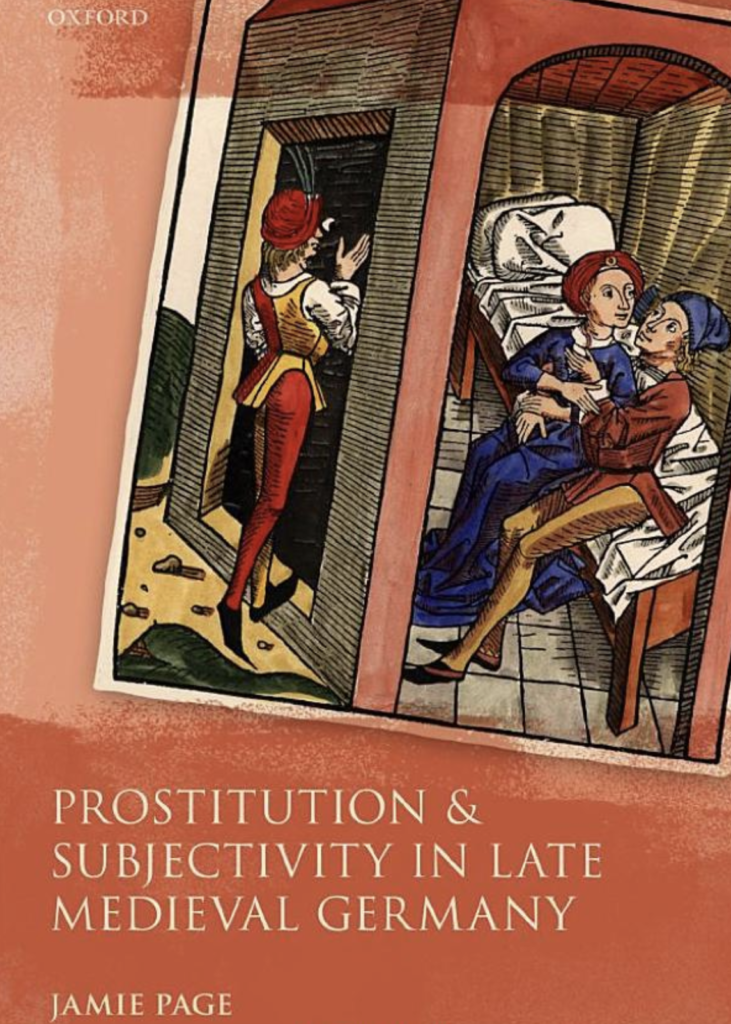Jamie Page
Prostitution played an important part in structuring gender relations in medieval Germany. Prostitutes were often viewed as an example of the extreme female sinfulness which all women risked falling into, yet their social role was also seen as vital to the unmarried men for whom they provided a sexual outlet. Based on three legal cases studies, Prostitution and Subjectivity in Late Medieval Germany is the first full-length study of medieval prostitution to focus primarily on how gender discourse shaped the lives of prostitutes themselves.

NOTCHES: In a few sentences, what is your book about?
Jamie Page: The book is firstly an attempt to write about late medieval prostitution from the perspective of prostitutes themselves. It uses three legal case studies from the German-speaking Empire and tries to show some of the ways in which women were involved in sex work during the period ca. 1400-1500. These ranged between casual, socially acceptable (or so I argue!) prostitution, to municipal brothels, to more obviously clandestine forms that risked censure from authorities. It’s also an attempt to explore various problems related to subjectivity as a historical concept; how prostitutes themselves have featured as historical subjects, both in the circumstances of a medieval trial and in more general historiographical terms, and how I have tried myself to take up a critical and reflective subject position as the historian narrating these stories.
NOTCHES: How did you become interested in the history of sexuality?
Page: I think there are several strands to this. I started out as a graduate student wanting to write about marginalised groups in the Middle Ages, but quite quickly found myself drawn to the theoretical work being done by people like Karma Lochrie and James Schultz on medieval sexualities. This led me in turn to Foucault, whose work on power and subjectivity I had also encountered in John Arnold’s studies of heresy and inquisition (especially his Inquisition and Power, 2001), in which he used Foucauldian models to formulate reading strategies to engage with inquisitional testimony. The two sets of interests dovetailed as I struggled to find a way to approach the testimonies of the women I write about in the book. It was only quite late on in the process that I came across work by scholars like Jane Scoular, writing in more philosophical terms about the subjectivities of sex workers. Judith Walkowitz was of course also very helpful here in showing how this can be done for more recent periods.
NOTCHES: One of the women you write about, Gerdrut Birckin, referred to her ‘miserable, shameful life’ as a prostitute. How far does this reflect medieval attitudes to sex workers and sex work?
Page: It’s certainly true that sex work could be seen as degrading and dishonourable throughout the entire medieval period. But there was also an era between ca. 1350-1500 when many cities in mainland Europe institutionalised prostitution as a public service. Women who worked in municipal brothels could expect a certain degree of support and protection (e.g. through board and lodging) and recognition for doing something that was seen to be necessary to maintain social order. In German towns, they might even be seen taking part in public events such as dances, weddings, and civic entry processions, and it’s been claimed that several emperors and their retinues visited municipal brothels, including Sigismund on his way to the Council of Constance. As I also argue in the book, and as historians like Carol Lansing have done, I think it’s likely that many communities tolerated women who used sex work as a survival strategy provided they did not operate too openly. Still, none of this means that the stigma attached to sex work wasn’t very strong throughout the Middle Ages. If we look at criminal prosecutions of insult and slander, for instance, it’s obvious that by far the most common term of abuse for women was ‘whore’. As Ruth Karras has long made clear, prostitution was both a socioeconomic phenomenon and, in symbolic terms, a pervasive form of social control.
NOTCHES: Many of the women in your case studies suffered terribly. Was life as a medieval prostitute unremittingly bleak? Should we view these individuals as victims?
Page: I think it’s important to bear in mind that these case studies are based on court records, so they only represent a tiny fraction of people’s experiences. They also show people at some of the very worst times in their lives. I think it’s certainly possible that life was less grim for others involved in sex work, though I haven’t really seen good evidence for this, still less so from the perspective of those who actually did the work. Whilst there is a persistent image of the medieval brothel as a kind of convivial, luxurious environment, e.g. in woodcuts or fabliaux, it’s hard to say how close these are to reality (though modern medievalist fantasy seems to love this kind of image – think Littlefinger’s brothel in Game of Thrones).
As for whether we should see them as victims, or perhaps as agents: this is such contested terrain within the history of prostitution, and I would hope that readers could find evidence that speaks to multiple perspectives. I have certainly tried to emphasise moments in each case where the women exercised resistance, but at the same time I have tried not to patronise them as historical subjects by somehow ‘granting’ them agency; as a critical or historiographical move, I worry that this might ultimately be disempowering. Rather than seeing them as victims (or as agents, or as anything else), I would hope that others can see that they were complex individuals who led meaningful lives. That might seem like a bit of a cop-out, but I hope it comes across as a desire not to oversimplify!
NOTCHES: What challenges did you face in writing the history of a marginalized group?
Page: As you might expect there were plenty of technical challenges relating to the sources, e.g. in terms of language, deciphering the legalese of the records, and the innate difficulties of trying to construct narrative on the basis of trial documents, which can often be contradictory and ambiguous (usually at the times you least want them to be!). And of course there was the very familiar challenge of writing about marginalised people on the basis of only a few surviving case studies; it’s difficult to know how representative each case is, through here I found it helpful to draw on microhistorical approaches (a genre I am very glad to see experiencing a renaissance).
I think the biggest challenge by far was how to constitute my own subject position in writing about the individuals in question. There’s certainly a danger of over-thinking the approach to the sources, but it seemed to me to be an important issue for several reasons. One the one hand, I felt that there was an overarching methodological problem to take into account, one tackled most fully within the history of crime and the inquisition. Some historians in this field have been accused of buying into the fantasy of letting the ‘voices’ within the records speak freely, by looking through the layers imposed by legal process and ignoring the historian’s own role in constructing narrative (the locus classicus for this kind of critique is perhaps Leonard Boyle’s appraisal of Montaillou, and many others have since added to his insights). I really wanted to avoid this in my own approach. At the same time, I think there is a strong imperative to throw light on the experiences of marginalized people and to make sure their voices – however we constitute that ‘voice’ – are part of the historiographical fabric. Prostitution itself is heavily bound up in concerns about agency and victimhood, which really come to the surface when we consider what kind of historical subjects sex workers are. For me this meant trying to strike a balance between illuminating the experience of the women I was writing about without imagining that I’m somehow freeing the subject, whilst also avoiding ‘overcoding’ their subjectivities by appropriating them for my own purposes. As you can see I found this all quite challenging and am not really sure of my success!
NOTCHES: Your book engages with histories of sex and sexuality, but what other themes does it speak to?
Page: I’ve already alluded several times to the core interest in subjectivity as a historical problem, so I won’t dwell on that any further. Beyond that, I think the book speaks fairly clearly to histories of work, both in the sense of formal, organised labour through the brothel system that was found in many European cities in the late medieval period, but also more informal, casual types of work done by women as part of the ‘makeshift economy’ sketched out in Olwen Hufton’s classic studies on the topic. I think medical and physiological practice is another key theme, especially in terms of reproduction, contraception and abortion. If we talk about survival, then these are clearly major issues in the lives of these women. Much previous work on medieval medicine has drawn on prescriptive sources, and I hope that the case studies I present offer some interesting examples of how these things played out in practice (chapter 2, for example, describes the preparation and administration of abortifacients in a brothel). Finally, I think the history of crime is another key context for the book. I’m especially interested in the methodological issues that arise when making use of trial records, and what kind of social and cultural histories we can write when making use of them.
NOTCHES: Why does this history matter today?
Page: I would like to think that the book adds the voices of medieval women to a long history of sex work which has, since at least the 1970s, sought to approach sex workers as ‘complex subjects’ (Judith Walkowitz’s term) without categorising their experiences through simplified labels. I also think that the historical distance of the women in question gives their voices a particular role in debates about sex work today. One of the most common (and certainly most tired) clichés applied to prostitution is that it’s ‘the oldest profession’. In some cases this is used to lend legitimacy to sex work, but I think there’s also an inherent risk in seeing it as somehow timeless, and therefore of overlooking the complex situations and personalities of the individuals involved – in other words, of making sex work and sex workers ahistorical. I think it’s important to emphasise the distinctive and contingent histories of the people involved, whenever and wherever they lived – without, of course, denying common experiences shared across different historical eras.
 Jamie Page is a trainee secondary school history teacher in Birmingham, UK. He received his PhD in German and Medieval History at the University of St Andrews in 2013, and has held research and teaching posts at Durham University, the Eberhard-Karls Universität Tübingen, and the University of Lincoln. He has published on topics of gender, prostitution and crime in late medieval Germany and Switzerland.
Jamie Page is a trainee secondary school history teacher in Birmingham, UK. He received his PhD in German and Medieval History at the University of St Andrews in 2013, and has held research and teaching posts at Durham University, the Eberhard-Karls Universität Tübingen, and the University of Lincoln. He has published on topics of gender, prostitution and crime in late medieval Germany and Switzerland.

NOTCHES: (re)marks on the history of sexuality is licensed under a Creative Commons Attribution-NonCommercial-NoDerivatives 4.0 International License.
Based on a work at www.notchesblog.com.
For permission to publish any NOTCHES post in whole or in part please contact the editors at NotchesBlog@gmail.com




